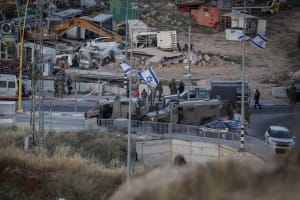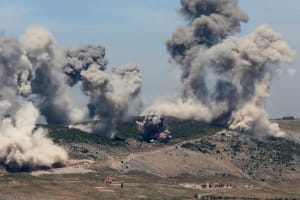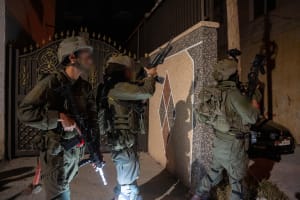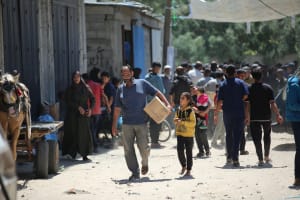WATCH: Ramadan in Israel: Religious observance and security challenges
Join All Israel 101 with Rotem Magen as she explores Ramadan, the holiest month in Islam, and its deep religious significance. From fasting and prayer to the spiritual atmosphere at Al-Aqsa Mosque, we uncover the traditions that define this sacred time.
Click on the video above to watch or read the transcript below.
Shalom, I'm Rotem Magen, and welcome to ALL ISRAEL 101, where we examine important cultural and religious aspects of life in Israel and the Middle East. Today, we're exploring Ramadan, the holiest month in the Islamic calendar, and its significance – both religiously for Muslims and from a security perspective in Israel.
Ramadan is the ninth month of the Islamic calendar, observed by Muslims worldwide as a period of fasting, prayer, reflection, and community. It commemorates what Muslims believe to be the first revelation of the Quran to Muhammad and represents a time of spiritual discipline and renewal.
Several key religious practices mark the month of Ramadan. Most notably, Muslims fast from dawn until sunset – abstaining from food, drink, smoking, and sexual relations during daylight hours. This isn't merely physical deprivation; it's meant to cultivate self-discipline, empathy for those less fortunate, and heightened spiritual awareness.
The fast is broken each evening with a meal called iftar, often beginning with dates and water. This follows the tradition of Muhammad, who is believed to have said, "When one of you breaks the fast, let him break it with dates, for they are a blessing. If he cannot find dates, then with water, for it is a purification."
Beyond fasting, Ramadan features increased prayer, including special nightly prayers called Taraweeh, charitable giving, and reading the entire Quran over the month. The conclusion of Ramadan is marked by Eid al-Fitr, a major celebration involving special prayers, meals, gifts, and family gatherings.
For Muslims in the Palestinian Authority territories and Arab Israelis, Ramadan holds profound religious significance and cultural importance. In Jerusalem, the Al-Aqsa Mosque compound has become a focal point with thousands gathering for prayers, especially on Fridays and during the final ten days of the month.
However, in Israel's complex security landscape, Ramadan also presents unique challenges. Unfortunately, Islamist extremists have historically attempted to exploit the religious fervor of their holy month to incite violence and escalate tensions.
Hamas and other terror organizations have been known to frame Ramadan within a narrative of resistance and jihad, drawing parallels to historical Islamic military victories and encouraging confrontation rather than the spiritual reflection that is meant to be the heart of the observance. These groups have sometimes explicitly called for a "month of terror" against Israel during Ramadan.
Israeli security experts have identified a strategic pattern where terrorist leaders deliberately stall peace negotiations to coincide with Ramadan, calculating that they can achieve a greater advantage through conflict during this period. By exploiting international pressure on Israel to ease tensions and increase humanitarian aid during the religiously significant month, these leaders weaponize this religious observance.
Israel's security forces face the complex challenge of balancing legitimate national security concerns with respect for religious freedom. Israeli officials consistently express commitment to maintaining normal access for Muslims to the Al-Aqsa compound on the Temple Mount, while implementing necessary security measures.
This balancing act requires sophisticated planning and coordination. Typically, thousands of police officers are deployed in sensitive areas like Jerusalem's Old City, with particular attention to Fridays – when the largest prayer gatherings occur.
When Ramadan and Jewish holidays like Purim or Passover occur in close proximity, as they sometimes do due to the different calendar systems, security forces implement even more comprehensive measures. The month of Ramadan creates additional sensitivity requiring careful management to ensure Jewish public safety.
Thank you for joining us for this ALL ISRAEL 101. For more insights into the complex religious and security landscape of Israel, please subscribe to our channel and visit us at allisrael.com. I'm Rotem Magen, and we'll see you next time.

The All Israel News Staff is a team of journalists in Israel.













